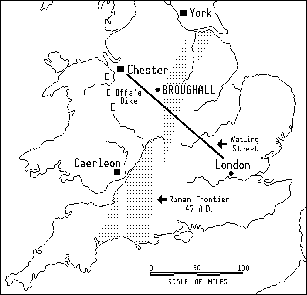|
|
|
Roman Britain
|
| Almost
a century passed until in 43 A.D., Emperor Claudius dispatched an army
large enough to thoroughly conquer Britain. The Roman legions landed
at the southeastern corner of the island and subdued the lowland plain
within five years. Once this administrative and supply base was
established, they began laying down the great military roads which
radiated from London. They permitted the legions to fan out over the
rest of the country. The greatest of these roads stretched from Londonium north-west across the island to Chester, just a few miles from
Broughall. |
 |
|
The Great Roman Road ran from
London to Chester. It passed within
a few miles of Broughall. |
The Celts
continually fought Roman conquest, but were no match for the power of
its legions. Eventually many withdrew into northern and western
mountains. The rough terrain precluded the use of chariots and the
narrow defiles prevented the Romans from forming their legions into a
powerful phalanx. Marching a legion single file through the passes
invited ambush and disaster. Conquest of these two areas was either
thought impossible, or not worth the cost, because Agricola,
Governor of Britain from 78 to 84, established a policy of simply
barricading the Celts into the mountains where they could do no harm.
The Celtic region to the west later emerged as Wales, the one to the
north as Scotland.
Roman Britain was defended by three legions, each containing 30,000
to 40,000 men. One was held in reserve at York; a second was stationed
in the northern part of the realm at Carlisle, where it built Hadrian's
Wall, to confine the Celts in Scot-land; and the third was stationed at
Chester on the Welch border. Its soldiers built many fortifications,
which may have included what later came to be called Broughall. In fact,
present day maps of England show the remains of three distinctly
different Roman roads converging on Broughall. For many years
historians maintained that the lowlands were almost completely cleared
of Celts, but present theory is that many of the
Celts remained, but in a subservient position.
In the fifth century, as the
empire at home was crumbling, Rome withdrew its legions. The ancient
Celts moved out of the mountains and once again settled in the plains of
Briton. Some of those confined to Wales undoubtedly settled around
Chester, near the site of Broughall. But the Celts of post Roman Britain
lacked the organization, leadership and war-like traditions of their
ancestors. They were not the fierce warriors encountered by Caesar.
|
|
 |
Hadrians' Wall as it may have looked
when
recently completed. It ran all the way across
England and isolated the fierce Celts in Scotland. |
|